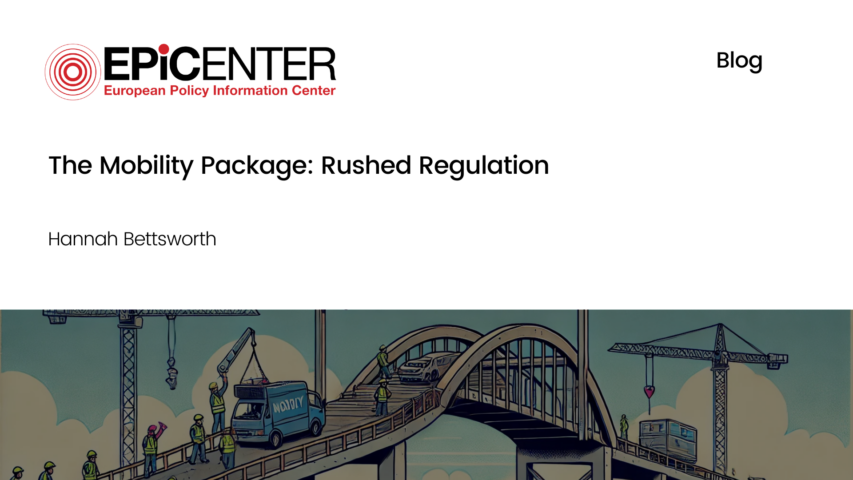The Mobility Package: Rushed Regulation

The Mobility Package: Rushed Regulation
Hannah Bettsworth // 15 April 2019
The intentions of the EU Mobility Package might be correct; to improve the conditions for long-haul truckers in the EU. As a cross-border industry, Member States alone are not well-placed to regulate this area, however, the pre-electoral wash up period is the wrong time to go about such a complex reform. Continuing on regardless could be damaging to both the industry and the European project.
When the reform of the Posted Workers Directive was passed in 2018, the road transport sector was deliberately excluded due to its complex nature. An important chunk of the Mobility Package aims to fill this gap.
According to the suggested reforms, when a driver is posted for longer than 3 days per calendar month to the territory of another Member State, the host country’s minimum pay rates and holiday provisions will apply. Cabotage operations – delivering goods within a Member State other than their own after a cross-border delivery – will be covered by these provisions from day one.
Additionally, the Commission also seeks to ban drivers from taking a weekly rest longer than 45 hours in their vehicle. The Parliament strengthened this to include shorter weekly rest periods, unless it was in a parking area with sufficient facilities. The Commission proposal also requires drivers to be able to return home for said rest at least once in three consecutive weeks. Parliament defined ‘home’ as the driver’s registered residence in an EU Member State and allowed the driver to choose an alternative location. Taken together, these proposals seek to improve the situation of ‘nomadic drivers’ who live in their trucks (outside their home country) for months.
The proposals have far-reaching political and economic consequences which have not been adequately considered. It is not currently possible to implement the Parliament’s ban. The facilities required simply do not exist. For almost 400,000 trucks, there are currently under 7,000 secure parking places in Europe. The International Road Transport Union has recommended shelving the full ban proposal and allowing drivers to spend their weekends in the vehicle provided it is appropriately equipped and minimum sanitary facilities are accessible to the driver. They suggest this would give the Commission time to monitor the situation and leverage EU funds and public-private partnerships to fund new facilities. It could then bring back the proposals when the provision has improved. It would also have the advantage of moving the issue into the next mandate, lifting electoral time pressures. This would give the legislature the chance to carefully consider reforms to policies it helped implement, rather than simply banning their unintended consequences.
Taking trucks back to their home base, beyond its potentially disproportionate impact on workers from peripheral member states, also risks damaging the environment. The EU has been active in promoting CO2 emission reductions and the Sustainable Development Goals, but this proposal would increase yearly HGV mileage by 45-75% and CO2 emissions by 100,000 tonnes a year.
The biggest issue, however, relates to competition and the impact of posted worker pay rules on the Single Market. EU Member States at the periphery will lose out, as those closer to main goods routes find themselves in a better business environment. They would also find themselves competing with non-EU operators involved in the cross-trade market, who would be almost impossible to bring under the Posted Workers’ Directive. SMEs will be incentivised to relocate, possibly even outside the EU, or may go bankrupt. The regulatory burden is a serious issue – companies may have to deal with up to 20 different national laws and up to 50 different minimum wages. For SMEs, that could mean removing themselves from the cross-border market completely. A plan that sought to improve working conditions could actually cost jobs or push people to become self-employed drivers in order to get around the posting rules.
It is no surprise, therefore, that the East-West cleavage which arose following the previous posted workers’ reform has reared its head once more. Central Europeans feel that their truckers are being excluded from the single market by French proposals. Initially, the three-day threshold was supposed to be a seven-day threshold, but it was reduced to satisfy the (potentially illegal) protectionist desires of France, Germany and Austria.
This was reflected in the chaotic plenary session on the 4th of April. There were 1,400 amendments to the proposed posting rules for drivers, and Eastern/Western bloc voting became readily apparent. The rules of procedure permit votes to be split into blocks, which were grouped by author’s name rather than by the article they referred to. The Parliament chose to do this midway through the vote, leaving one Polish MEP to protest that he could no longer correctly express his will. Accusations of voting procedure irregularities create a risk of legal action, which would do little to assist drivers or the industry as a whole.
Tales of nomadic drivers stuck far from home and living out of their trucks appear to be an urgent problem. The temptation to find a quick solution is understandable from the perspective of a politician looking for a good story to tell voters. However, a rushed package could have far worse effects in the long term. It was a mistake to use the Mobility Package to class drivers as posted workers.
The Parliament may have reached its position, but the trialogues will be just as divisive. Trying to complete this process in a few weeks is counter-productive and pointless. The best way forward is to drop the driver posting rules and do a full economic impact assessment of the remaining, salvageable, proposals. Regulatory burden, competition issues, and disproportionate impact on some Member States should be assessed, as should the feasibility of these rules. If a realistic solution which the East and West can respect is found, it should be put forward for debate in the next Parliament. There will be no place for heavy-handed posted worker pay rules in such an agreement.
The opinions in this article belong to to author only and are not necessarily representative of EPICENTER or its member think tanks.
EPICENTER publications and contributions from our member think tanks are designed to promote the discussion of economic issues and the role of markets in solving economic and social problems. As with all EPICENTER publications, the views expressed here are those of the author and not EPICENTER or its member think tanks (which have no corporate view).



